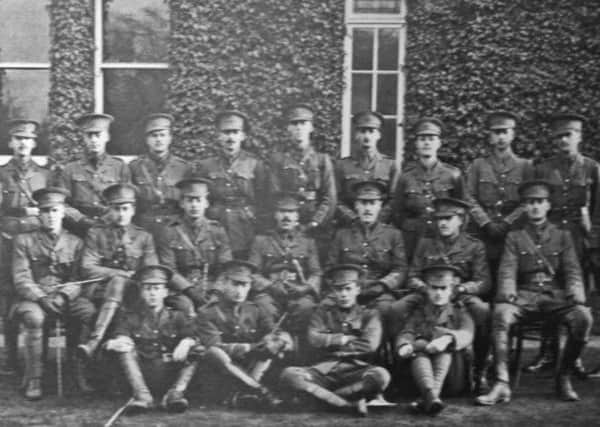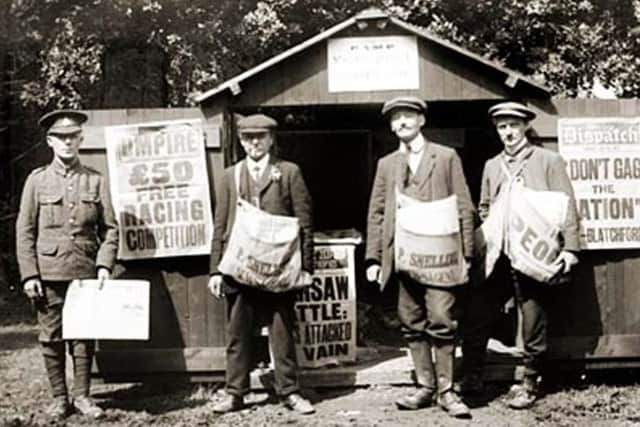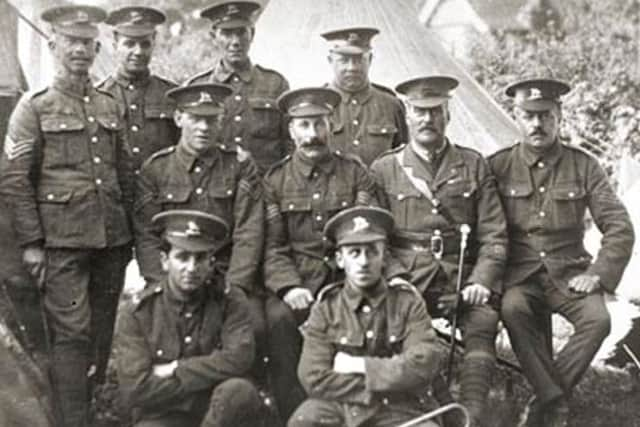Crawley History: Reports of frontline heroes and deserters '“ and a war poet


Next time you are in the Memorial Gardens, take a moment to pause and read the names either side of the gates.
They represent the heart and soul of a tiny Sussex town – young men from all walks of life who marched off to foreign shores and never returned.
Advertisement
Hide AdAdvertisement
Hide AdIt’s easy to forget the names are there – they are just another familiar landmark in an ever-changing town.


But this year, of all years, we should take the time to pause and wonder what it was like for them as left their jobs as farmers, millers, labourers and took on the mantle of soldiers, sailors, airmen.
Geraint Thomas, a councillor and former teacher,has taken the time to research some of the newspaper articles of the period relating to Crawley – and they made disturbing and often moving reading.
The articles were all published during the opening few months of the war, between October and December 1914.
Advertisement
Hide AdAdvertisement
Hide AdThey relate the honour of signing up to fight and demonstrate the stigma attached to any men, of fighting age, who had not joined up.


While every family with a father, son or brother in the military had cause for both pride and concern, one Crawley man felt it five-fold.
One brief report told the town that Mr H Charman, of Three Bridges, had five sons serving. Four in the army and one in the navy.
Among the sadder reports was one of the first deaths Crawley had to endure.
Advertisement
Hide AdAdvertisement
Hide AdThe fallen man was Francis Franks, third son of Mrs Franks and the late William Franks, of Ifield village.
Under the heading ‘An Ifield man’s death at the war’, the report stated he had been a lance-corporal in the Durham Light Infantry and was seriously wounded during a battle before succumbing to gangrene in a Paris hospital.
The closing paragraph was one which would be repeated in one form or another more than 100 times before the war ended.
It read: “In communication to his mother, the matron at the Paris Hospital refers to the brave way he fought for his country and to the brave manner in which he bore his suffering.
“This is the family’s great consolation.”
Advertisement
Hide AdAdvertisement
Hide AdWounded soldiers received plaudits in the reports as they convalesced at home.
One Private Eggleton, of Albany Road, was shot through the finger but, said the report, would be returning to the fighting line as soon as he was fit.
While Private Gravely, of Malthouse Road, had already returned to his regiment after recovering from a poisoned foot, torn open when he became caught in barbed wire entanglements.
While some men were wounded and dying in battle, others were being arrested on the home front and charged with desertion.
Advertisement
Hide AdAdvertisement
Hide AdWhether they were injured men suffering shell-shock or simply those who did not want to fight, all received the same treatment - they were turned over to the military for trial.
For many, that trial led to execution by firing squad.
For the people who tracked them down, there was a monetary reward.
The reports showed Crawley Police Sargeant Capelin captured a man who had been living in Ifield Wood having fled his unit, the 2nd Battalion of the Coldstream Guards.
A second man was found walking out of Crawley towards London after selling his military overcoat for five shillings.
Advertisement
Hide AdAdvertisement
Hide AdHe was absent without leave from the Royal Warwickshire Regiment.
Both men were handed over to a military escort while PS Capelin was given a reward of 15 shillings for showing “a great deal of shrewdness” in their capture.
While PS Capelin was busy tracking down deserters, PC Webster, who had also been stationed at Crawley, was serving as a gunner with the Royal Horse Artillary.
In a letter home, he wrote: “I don’t mind how soon this job is over as night and day we are at it.
Advertisement
Hide AdAdvertisement
Hide Ad“I think they (the enemy) are getting fed up. It is very cold out here at night.”
War poets such as Wilfred Owen and Siegfried Sassoon gave the world a first-hand account of life on the battlefields of the First World War.
Crawley man Donald P Sims, son of Mr and Mrs JG Sims, wrote the following.
Nil Desperandum!
At last the hovering clouds have dispersed
And war, dread war, confronts us all.
Peace hopes are blighted, and we’ve nought to do
But answer bravely to our duty’s call.
The hour has come, the crisis of our fate
And we must steel our hearts to meet the blast.
Disaster and success they both will come
One shock upon another falling fast.
We’ve stripped to fight, we’ve drawn the sword
Because the cry for help we heard.
Not because we wished to demonstrate our might
But faithfully to keep our plighted word.
Our grim, grey squadrons patrol the deep
Keeping lonely vigil night and day.
Preserving sure the safety of our shores
Til fear of dread invasion has all but died away.
My God! Could we feel the strain on officers and men
As they stood by their gun aboard.
And wait and watch til skulkers come out
To give them their just reward.
The black uncertain depths of night
The murky fog by day.
Our once great shield in this hour of need
For success to their prowess we pray.
Our khaki warriors are marching on
By the side of allies tried and true.
United in one splendid grand resolve
To falter not nor waver til we’re through.
From distant shores our friends are coming fast
Canada, Australia, India too.
South Africa, New Zealand, all loyal to the last
Sending aid to help their mother ‘cross the blue.
When first they flung the gauntlet down
They thought to catch us unprepared.
By strife and tumult ‘sunder torn
They little dreamed we dared.
But once they trespassed Belgian soil
And broke their plighted word
We sent our ultimatum sharp -
“Now choose ye! Peace or sword!”
What braggart despot lit the flame
Of fire that burns today.
We know him well, we know his name
He has been scheming for “The Day”.
Arch fiend, filled with base desire
Apostle of a baser creed
Deeming it nought to bathe thy soul in blood
If ‘twill but satiate thy devilish greed.